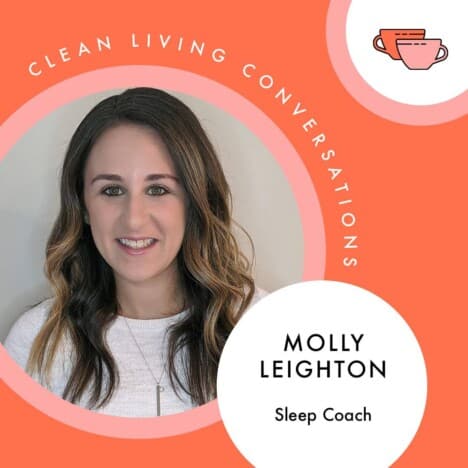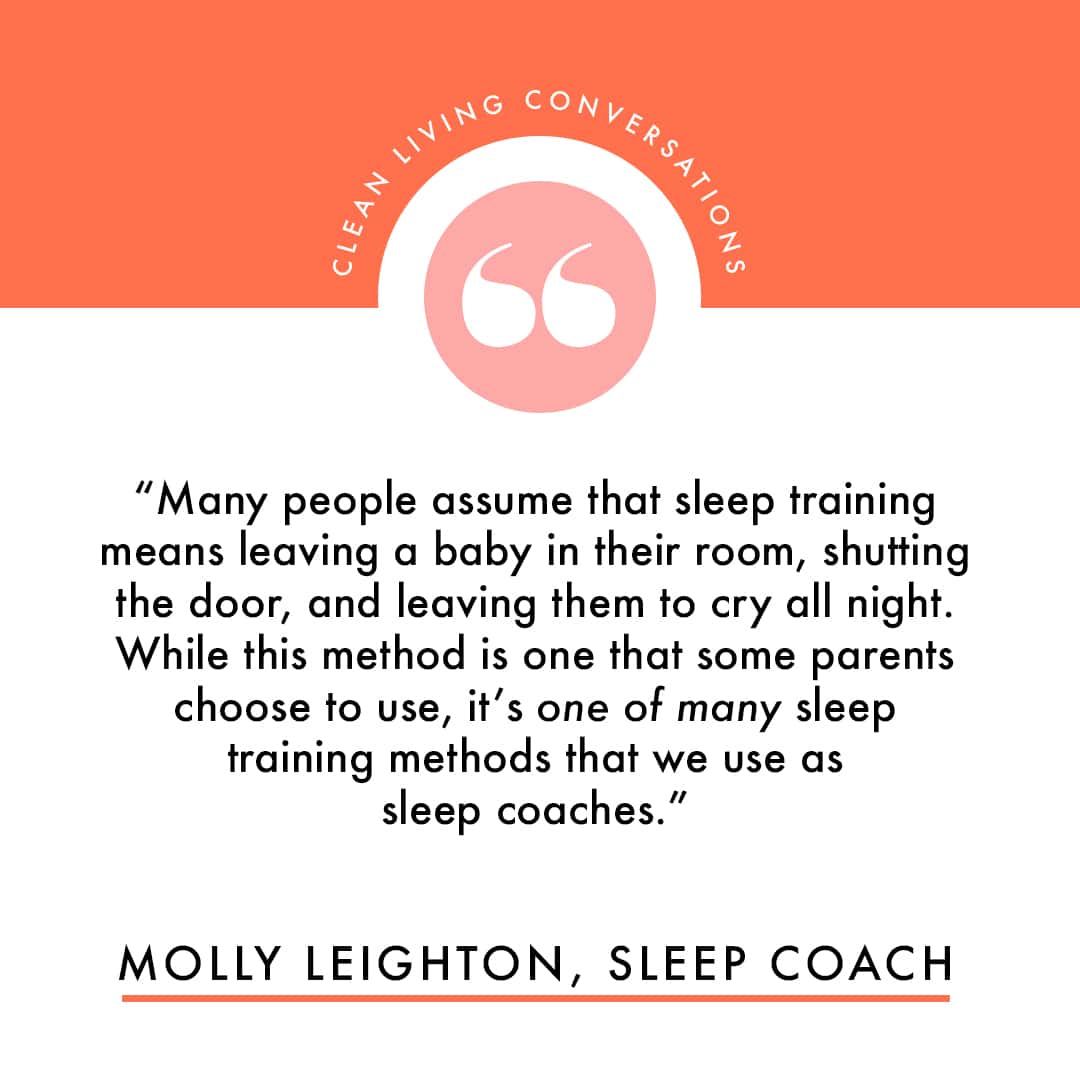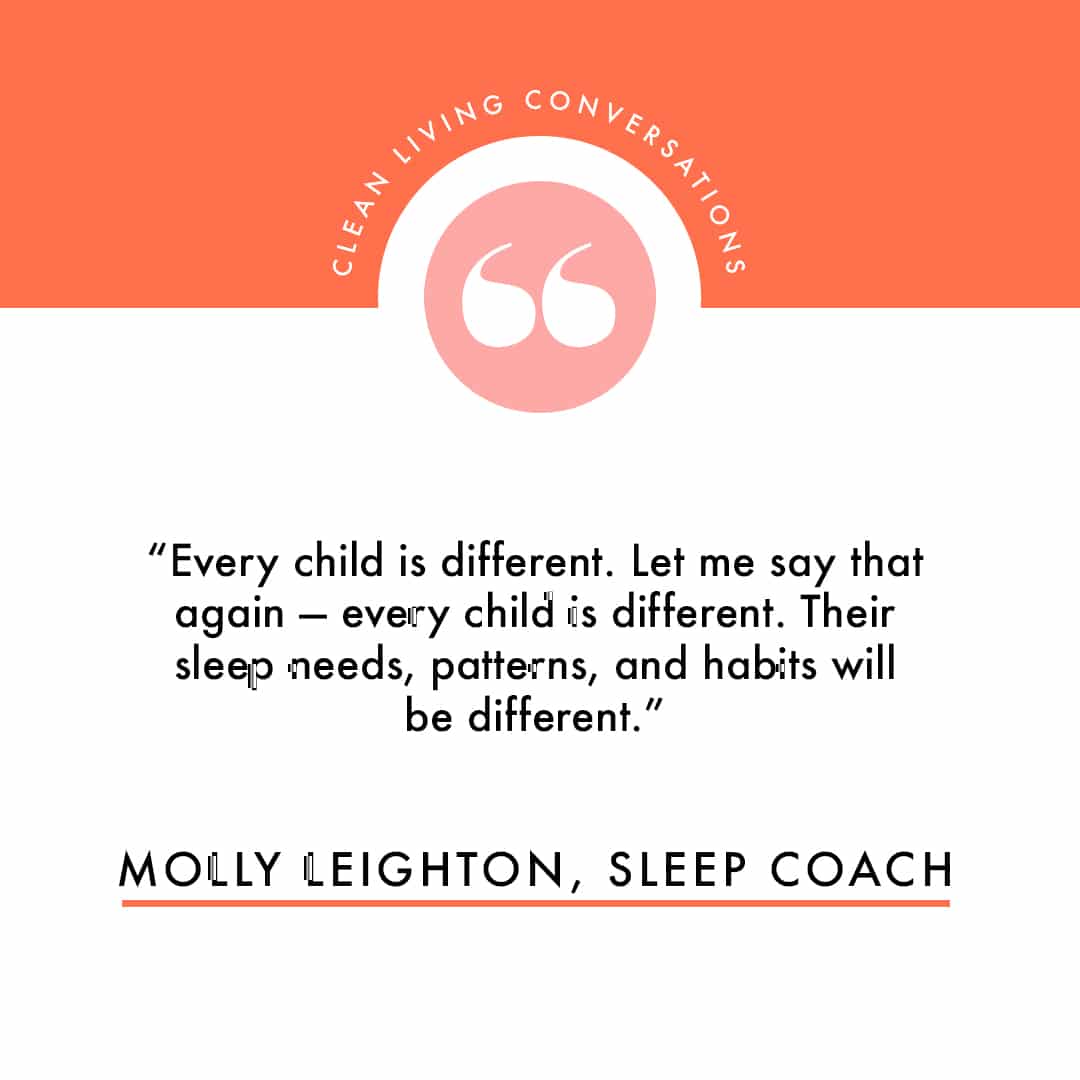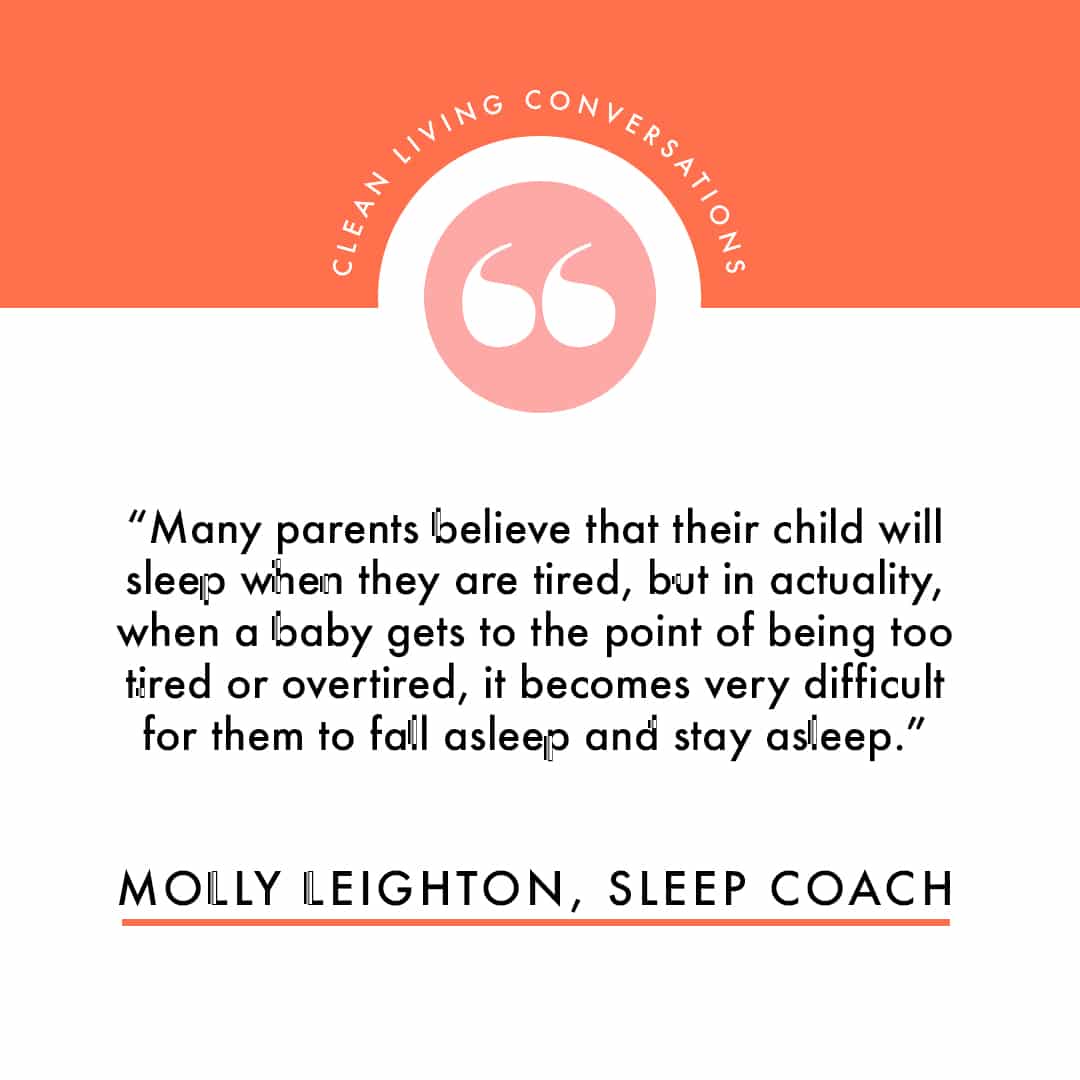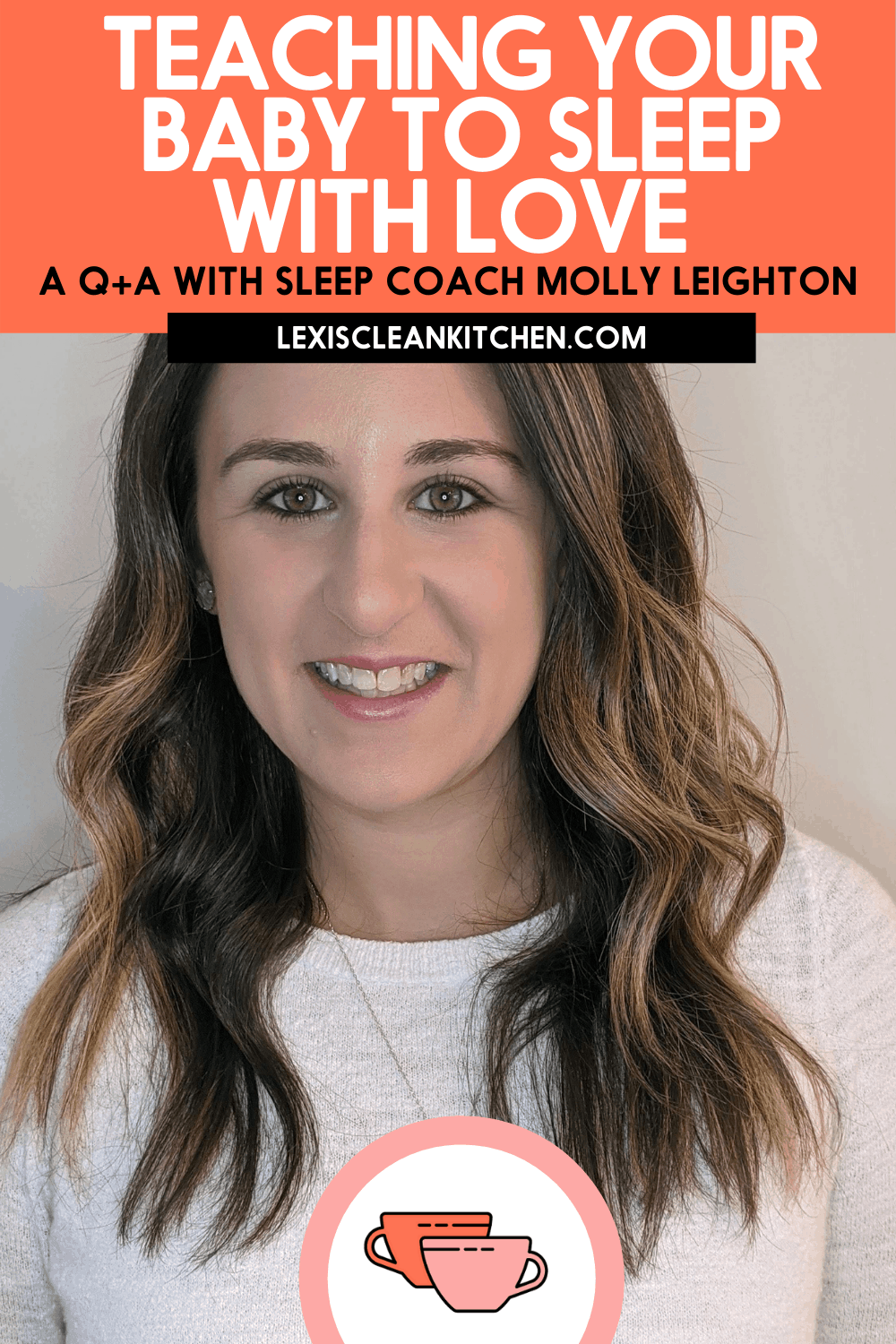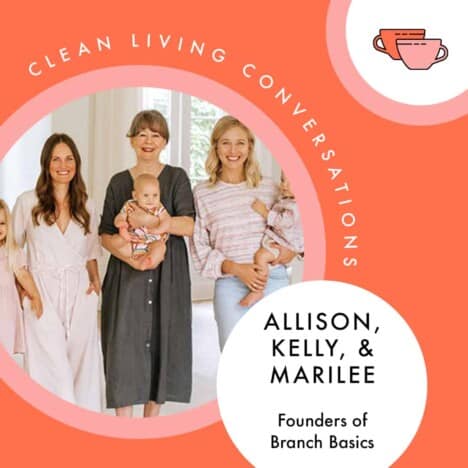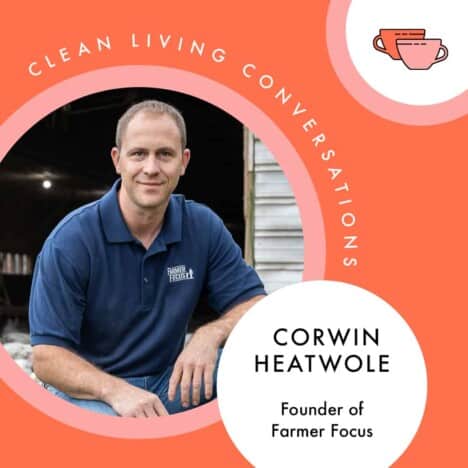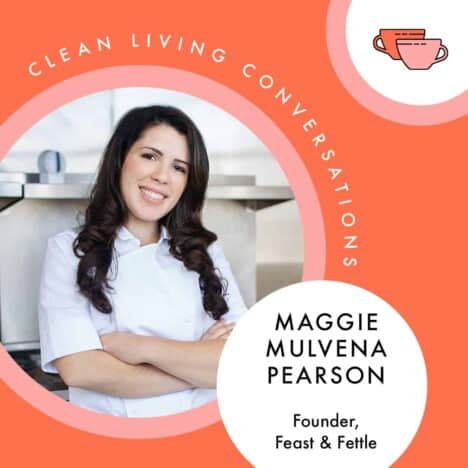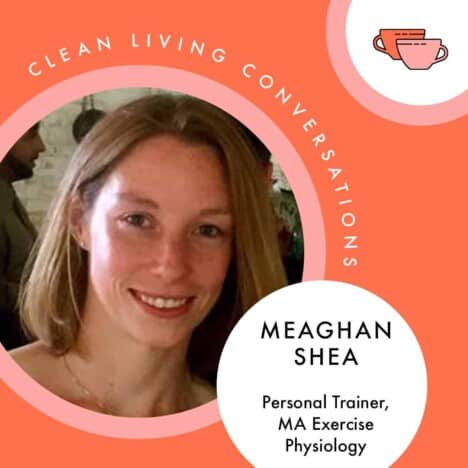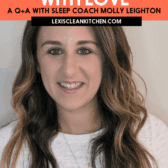This post may contain affiliate links. Please read my disclosure policy.
For today’s installment of Clean Living Conversations, I’d like to introduce you to Molly Leighton. Molly is a wife, toddler mom, and founder of Sleep Shore Sleep Consulting, which means she is a certified pediatric sleep coach. She completed her certification at Dream School and has been helping families — including ours! — with sleep for the last year and a half.
I’ve gotten lots of questions over the last few months about Skylar’s sleep schedule and what has worked best for our family. My answer? Working with Molly! Molly creates customized sleep plans based on each child and family’s unique set of development considerations. Skye, Mike, and I have had a fantastic experience with the program and (spoiler alert!) our baby girl is now a great sleeper. The best part is that I feel really good about how we got there since we were hesitant about the process.
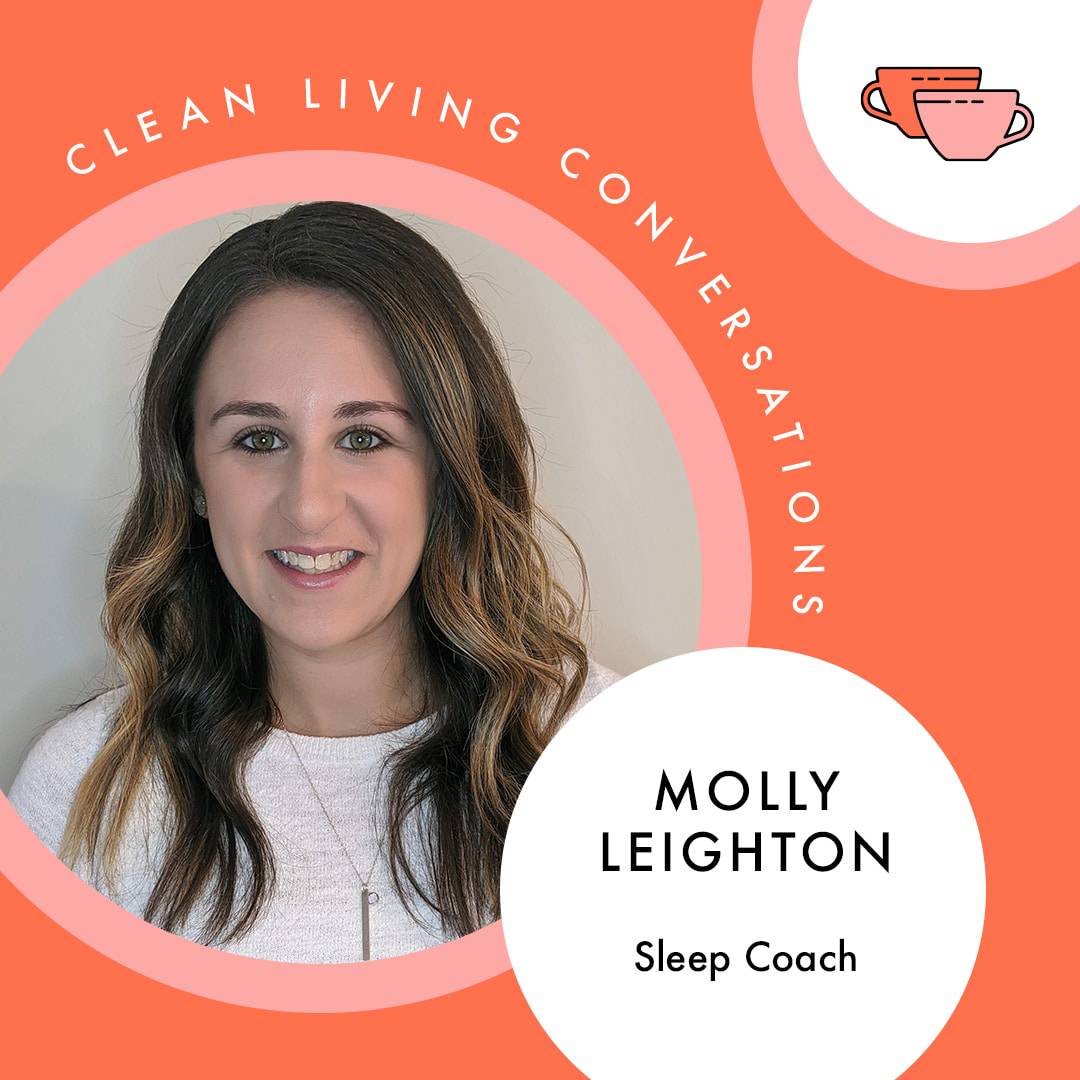
Teaching Your Baby to Sleep: Sleep Training Q&A
I connected with Molly through some mutual friends when Skylar was going through her four-month sleep regression. During this time, she was waking up and eating so much at night that she wasn’t eating very much in the morning and then needed more night feedings to correct for it. Plus, she was only taking twenty-minute naps. As a family, we were in a tough cycle. All of us — especially Skylar! — were constantly overtired. I was hesitant about “sleep training,” but I realized that something needed to change. I had heard great things about Molly, so I decided to set aside my skepticism and see what her method was all about.
Molly reassured us that sleep training can mean so many different things. We were not comfortable with the idea of letting Skye “cry it out” all night, and we learned we wouldn’t be expected to go that route if we opted to pursue sleep training. So we decided to give it a try! We worked with Molly for three weeks and she gave us the hand-holding we needed as new parents. Seriously, though — she was so accessible to us when it came to naps, swaddles, bedtime, and all things sleep. The plan Molly gave us proved invaluable and now Skyle absolutely loves to sleep. Plus, she’s a happier baby, and that makes me a happier mama. I’m so glad I decided to set aside my hesitations to learn more about what sleep training can really look like.
Keep scrolling to learn more for yourself from Molly!
Tell us more about what got you interested in sleep for babies and kids! What was the journey to Sleep Shore?
Well, I was a sleep deprived first-time mom and I needed help! I was so tired of searching, Googling, and buying the products that “guaranteed more sleep for your baby.” I was referred to a sleep coach and remember saying “Just tell me what to do and I’ll do it!” That was exactly what [the trainer] did — she wrote me a sleep plan, coached me through the ups and downs of sleep training, and was there by my side every step of the way.
Once I came out of the sleep deprived fog and my son was sleeping 12+ hours a night (yes, I said that!), I realized how valuable our sleep coach was and the impact she made on our lives as an entire family. I decided to take my appreciation and pay it forward to other families. I then pursued my certification. [Since I] completed it, I’ve been working with families to understand their child’s unique sleep patterns and work together to a solution that results in sleep for the entire family.
Sleep — more specifically, sleep training — has become such a hot topic for parents over the last few years. Why do you think it can be so emotional/triggering to talk about sleep for our little ones?
The term “sleep training” certainly has a bad rep and connotation. There is a lot of information out there on babies, children, and, of course, sleep. This can be helpful, but also hurtful. Many people assume that sleep training means leaving a baby in their room, shutting the door, and leaving them to cry all night. While this method is one that some parents choose to use, it’s one of many sleep training methods that we use as sleep coaches.
What’s the number-one piece of advice you would give to new parents struggling to get their baby into a healthy sleep pattern?
Consistency — oh, and coffee 🙂
But in all seriousness, consistency is the name of the game. I talk to so many parents who say they’ve tried it all, and when we dive in deeper, they share that they’ve tried something for one or two days or nights and then tried something else because it didn’t work.
Think about yourself. When you are trying to learn a new skill, how long does it take? Longer than one or two days, for sure! Babies are no different, and sleep is a big, complex skill to learn. This is why I work with clients for a minimum of two weeks. The consistency, accountability, and coaching that I provide is what helps improve my clients’ sleep struggles.
What are a few things that families can do to help their kids (of any age) establish lifelong healthy sleep habits?
Families can begin establishing healthy sleep habits as soon as they come home from the hospital. I know what you’re thinking — When you come home from the hospital? Isn’t that one of the hardest times for parents, filled with dirty diapers, spit up, and just trying to figure out how this whole parenthood thing works? Well, yes — BUT, it’s never too early to start creating healthy sleep habits.
Newborns can have their days and nights mixed up, so try to expose natural light during the day and keep it dark at night. This will help rectify any day/night confusion. Use white noise for all sleep. White noise helps mimic the sound of the womb. When your child is sleeping, make sure the room is pitch black, like a cave. Any tiny bit of light can stop melatonin production, which disrupts sleep. Lastly, keep an eye on wake time and age-appropriate schedules. This is especially important for newborns and infants and can help avoid overtiredness. When a baby is overtired, their brain fills with hormones that prevent them from being able to fall asleep easily and/or stay asleep. This can lead to short naps, frequent night waking, and/or early rising. A very important part of sleep habits is practicing safe sleep. This means putting your baby on their back on a hard, flat surface for all sleep. In the newborn stage, it is fine to hold or wear your baby for naps, as long as parents are awake as the baby sleeps.
Another sleep habit to start right away is implementing a bedtime routine. We all thrive off routine, even newborns. Newborn bedtime routines may vary from day to day as their sleep is erratic, but as they get older, bedtime routines are an incredibly helpful way to create consistency and help your baby know what to expect!
How can parents figure out what sleep habits or routines will work best for their children and families?
It can be a bit of a trial and error process at the beginning, but the best thing to do is to be consistent. This means starting and trying something for at least a week and then determining if there needs to be a change.
Another piece of advice to help solve the sleep puzzle is to try not to compare yourself and your baby to your friends. Don’t get me wrong — use your friends and community to connect with and support you, but try not to compare your baby to others. Every child is different. Let me say that again — every child is different. Their sleep needs, patterns, and habits will be different.
Let’s talk about naps! What is your philosophy on naps for babies and young children?
When my team and I look at sleep, we look at it in a 24-hour period and naps are a crucial part of that. Did you know that between conception and age three, a child’s brain undergoes a remarkable amount of change? In fact, most of the brain’s actual growth occurs during the first three years of life, so proper rest for infants and toddlers is essential. Naps are mentally and physically restorative and a critical component to development.
Depending on their age, babies take anywhere from one to six naps per day. Naps typically start to consolidate between four and six months. Once babies are on a regular nap schedule, the first nap has been shown to be mentally restorative, while the second nap is physically restorative. The third and fourth naps, however, are not restorative and are used to get to a later bedtime.
What is your philosophy on sleep training? How can we make the idea feel less scary?
Sleep is nourishment for our brains and is just as important as eating a healthy, well-balanced diet. During sleep, energy is restored, tissue growth and repair occurs, blood supply to the muscles increases, and appetite is regulated. Our immune system strengthens while we sleep, too. Sleep is vital for proper development in children. When we are well rested, we are attentive, happy, able to focus, and better at functioning physically. Sleep also enhances our learning and problem-solving skills. Unfortunately, sleep is not prioritized in many families the way that a proper diet or education might be. Many parents believe that their child will sleep when they are tired, but in actuality, when a baby gets to the point of being too tired or overtired, it becomes very difficult for them to fall asleep and stay asleep. The child might even seem hyper with no signs of being ready for bed. The parents or caregiver may be led to believe that the child just doesn’t need as much sleep as another child, but this is very far from the truth.
Sleep training can be a taboo subject for many people. In reality, sleep training is just teaching your child the very important lifelong skill of independent sleep — to fall asleep and stay asleep on their own. We teach our children how to roll, sit, crawl, walk, eat, and speak. Sleeping should not be any different! Sleep dependencies such as rocking, swaying, and feeding can lead to inconsistent naps, bedtime battles, very late bedtimes, multiple night wakings, and disrupted, restless sleep. The sooner we can help our babies learn to fall asleep on their own without our assistance, the better.
I am certified in helping families with children starting as newborns and up until age nine. When you work with me here at Sleep Shore, my support includes a custom and individualized sleep plan, one-two weeks of coach support (which includes daily — sometimes hourly! — emails), and continuous support after the plan is complete. I am not a guide, a book, or a video. I am a real person, trained by scientists and experts in the sleep space, and I become a part of your family to help you get the rest you need.
What kind of pep talk would you give a parent who is worried about their child’s sleep habits?
Be patient, trust your instincts, and enlist the help of an expert. When it comes to your child, you want the absolute best care, and sleep is an important part of care. Do your research, then find a sleep expert who will listen to your needs and will be there to guide you every step of the way.
Also, try to remind yourself of why you decided to work on your child’s sleep. You’re exhausted? You’re sleep deprived? You want more time at night to spend with your partner? You want your child to be well rested? Whatever it is, remind yourself of that as you’re working on your child’s sleep. During the time that you’re sleep training, there will be crying, there will be adjustments to their schedule, and there may be points of frustration, but remind yourself why you are doing it. That will help keep you on the right track!
Lastly, can you share a few of your must-have products for baby sleep?
- A good sleep sack (once transitioning out of the swaddle)
- Black out curtains/shades
- A white noise machine (I’ve heard this one is good, too)
- SlumberPod for travel (Thanks to you Molly, I love it too, LEXI20 for $20 off!)
And now it’s time for our Clean Living Conversations signature questions. You’ll find these questions in every installment of this Q+A series!
What is one thing that is guaranteed to make you laugh? Anything with Amy Schumer, Tina Fey, or Maya Rudolph — and Schitt’s Creek!
What do you eat for breakfast? Iced coffee. Always iced (I know — it’s a thing). Either yogurt with fruit or an egg on an English muffin with avocado.
What’s one assumption about sleep and babies that you’re tired of hearing? One question I get asked a lot is, “Will sleep training have any negative impacts on my child?” The fact is, if your child is sleeping poorly, you owe it to yourself and to them to help them sleep! There are many safe and well-studied ways for you to do so (and our coaches are trained on all of them!). Don’t feel bad about making changes that will benefit your whole family in the long term. In addition, sleep is essential to brain development. Studies continue to show us that sleep is just as important as nutrition and secure attachment. This study also found no evidence that sleep training had negative effects.
Finish the sentence: I never leave home without… water, usually an iced coffee, snacks, and my Air Pods.
What are the best podcasts you’ve listened to this year? I’ve been addicted to the Michelle Obama podcast, Just B, and The Mom Hour.
I’m so grateful to Molly for joining us for this deep dive into sleep! Follow Sleep Shore Sleep Consulting on Instagram @sleepshore and learn more about her work on Facebook, too.
If you are ready to get your newborn, infant, toddler, or school-age child sleeping an extra hour, or perhaps the goal is your child sleeping through the entire night, you can check out Molly’s package options here and get connected with Molly within 24 hours.
Use code LEXI10 for 10% off! Have questions about what package is best for you? Email Molly directly at Molly@sleepshore.com.
Pin this article for later:
DISCLAIMER: Before beginning sleep training, consult with your child’s pediatrician. These Q&A articles provides general information and discussions about health and related subjects. The information and other content provided in this blog, or in any linked materials, are not intended and should not be construed as medical advice, nor is the information a substitute for professional medical expertise or treatment. If you or any other person has a medical concern, you should consult with your health care provider or seek other professional medical treatment.
